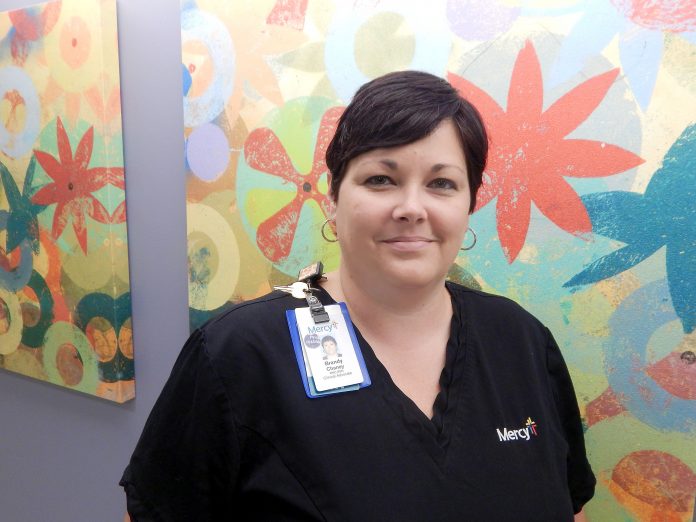
by James Coburn – Writer/Photographer
Brandy Chaney, RN, knows first-hand the value of the Neonatal Intensive Care Unit at Mercy Hospital in Oklahoma City.
She found out she was having twins during her first six months of working there. Her babies ended up being patients in the NICU as well.
“So I always tell parents that I’ve been on both sides of the bedside, to where I’ve been the nurse and I’ve been the parent,” Chaney said. “I think that helps me a little bit in what I do.”
Her position as a clinical advocate allows her to educate nurses about new products. She serves as their advocate for bringing in new things so that they can do their best work possible for the babies they help.
She always wanted to be a labor and delivery nurse, but when she was doing her clinical work at nursing school, she spent some time in the NICU.
“Once I was here, I was sold and never wanted to do anything else,” Chaney said.
Her husband is a paramedic and they both say they are happy with their careers, thinking they would not be suited for each other’s careers. Chaney has been with Mercy for 15 years with 12 of those years at the NICU.
September was designated as Neonatal Intensive Care Awareness Month. Mercy Hospital continues to strive to meet the challenge for caring for delicate lives born at its NICU in Oklahoma City, said Shonna Cox, RN, assistant nurse manager.
“We have a level 3 nursery and I think we do a great job as advocating for babies to stay with parents as long as they can,” Cox said. “We have something called the Transition Nursery.”
The Transition Nursery was started within the last two years. If babies don’t necessarily need to be admitted to the NICU, they can go to the Transition Nursery and be looked after by an NICU nurse.”
Both women have been witness to hundreds of lives touched by Mercy. One of the latest babies was born at 22 weeks and five days into development.
“She was a triplet and she ended up being the only surviving one, but she’s been our youngest surviving one recently.”
Chaney said many of the infants grow up to become children who return to Mercy with their parents to say thank you. Christmas cards arrive every year filling a large double door.
“We actually have a NICU family Facebook page now,” Chaney said. “We see a lot of birthday pictures on there,”
Chaney’s own girls were born a pound apart. They are 11 years old now and are about 15 pounds apart in weight. They also differ in height by 5 inches.
Her experience helped her to be more empathetic as a nurse. She knows what it’s like to go home to an empty crib without her newborns.
Chaney said she always felt like she was leaving her babies with friends instead of at a hospital when she had to return home.
“I know, too, what it’s like to be hopeful that they’re coming home one day and now we’re looking at them being here another two weeks,” Chaney said. Infants in the NICU usually stay there from two days to six months.
The NICU runs as a well-oiled machine. Great cooperation and teamwork is a comment often heard by the NICU staff. The NICU has been super busy this last month with nurses coming in to work overtime every day, she said.
“It’s heartening to see how dedicated we all are in making sure all our babies are being taken care of,” Chaney said.
Mercy reinforces its system of care by equipping its nurses with the technology and continuing education that saves lives. Cooperation with other Mercy hospitals helps to make this possible, she explained.
They do quarterly reviews, presenting the best evidence-based research in the field. Emergency procedures must stay as up-to-date as possible to ensure optimal care.
Most NICUs have evolved into doing a family centered care model, Chaney continued. They focus as the family as a whole as the patient and not just the baby, she said.
“We have a whole series of education classes for the parents to help them be involved in the babies’ care,” Chaney said. “We’re changing policies all the time so they can do some of the things the nurses do. We’re working on training for the parents to do baths all the time so they don’t have to watch the nurse give their baby a bath.”
The hardest part is separating the parents from their babies. So anything the nurses can do to alleviate that is becoming more common in the NICU.
“We get to see that what we’re doing is not in vain,” she said. “There’s hard days. We have kids that don’t make it, that aren’t doing wonderful but they’re still out there.”
“We had another baby that was here for a long time and she went home for a month or two and she got sick. So we all got to help support her mom even when she wasn’t a patient here, but was a patient somewhere else. And that meant a lot to that mom. She expressed several times how much it meant to her that we were still supporting her.”












